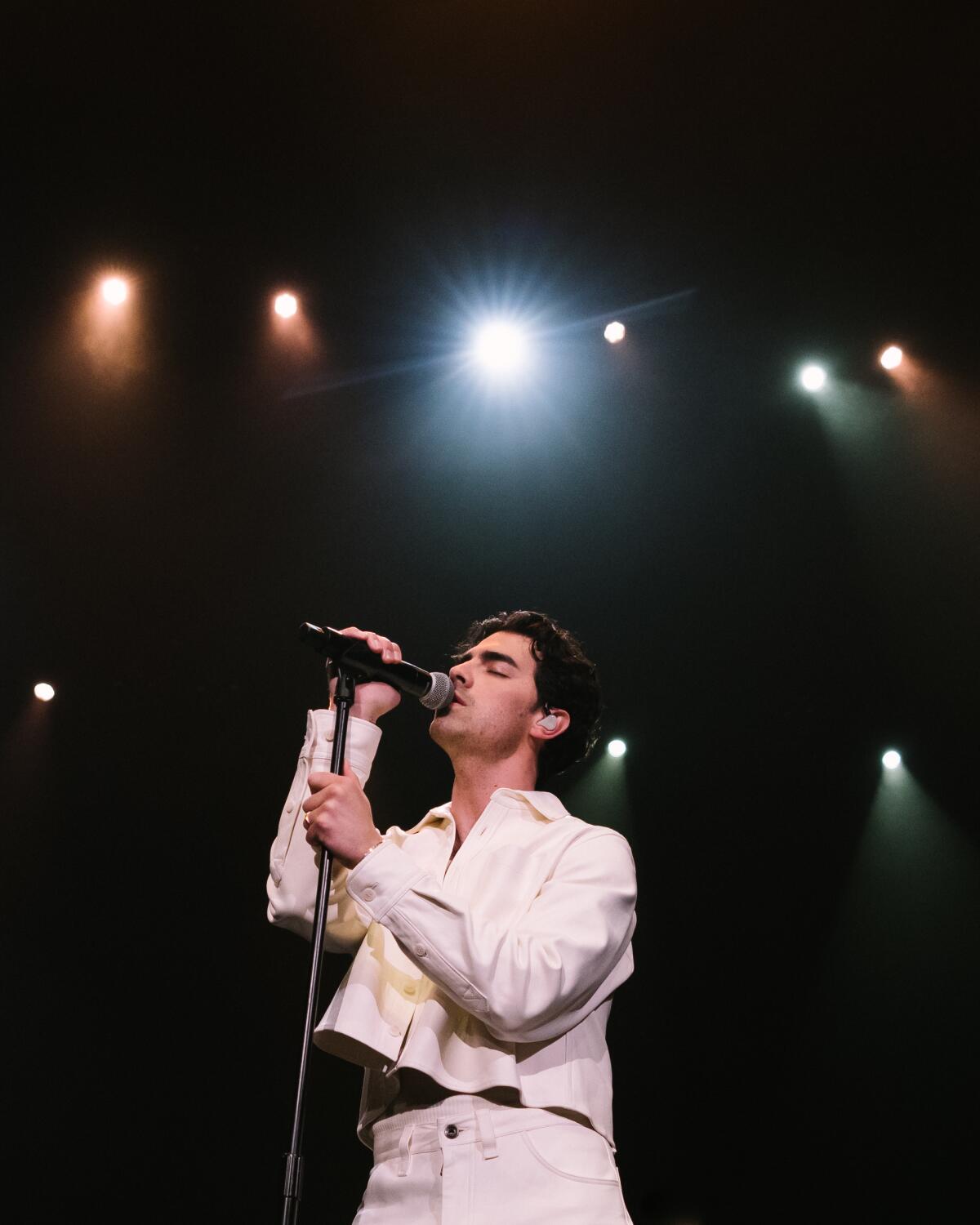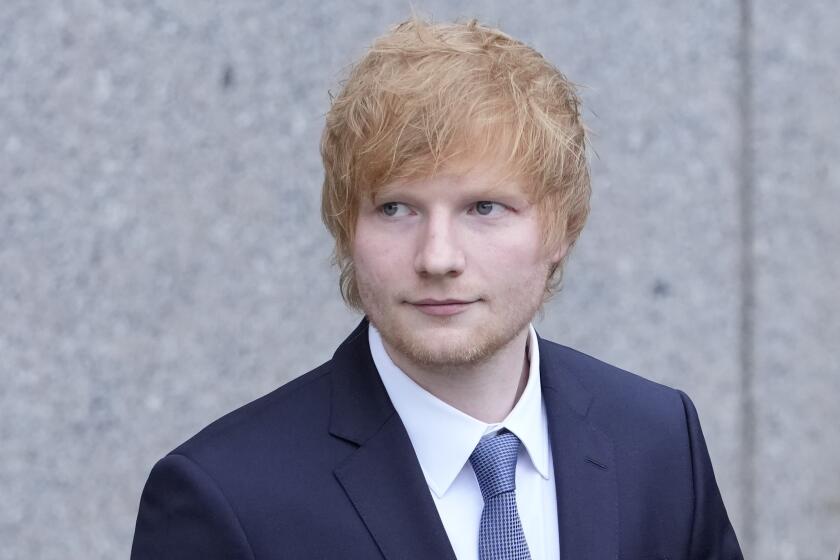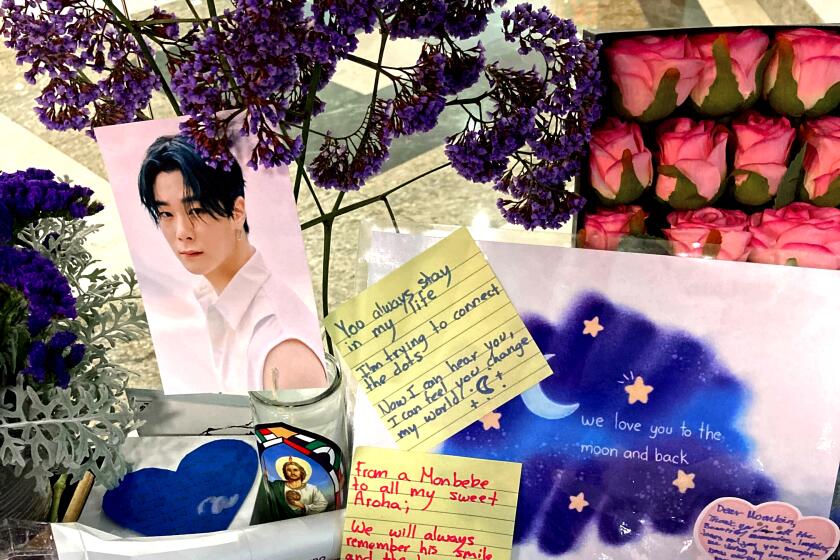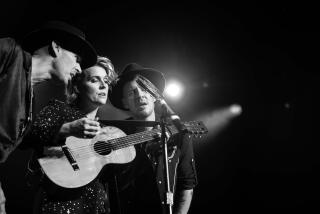The Jonas Brothers debut songs about fatherhood while an audience relives its youth

- Share via
At the pristinely restored Gothic theater in downtown’s Ace Hotel, the Jonas Brothers emerged in impeccably tailored, loosely coordinated outfits (a gentle callback to their early ’00s boy-band heartthrob days) and in front of a five-piece band and seven-member choir (a newfound maturation). Long gone are the days of Nick, Kevin and Joe’s fringe haircuts and Disney Channel affiliations — this was an evening designed to introduce JoBro fans to their upcoming album, “The Album,” which Nick, the youngest of the three at 30, described as being about “family, fatherhood and love” as he floated a kiss to his wife, actor Priyanka Chopra, in the balcony.
It was a far cry from the days when they proudly wore purity rings.
Tuesday’s show was part of a series of “One Night Only” concerts in Los Angeles, Baltimore and Dallas. In L.A., 1,600 or so fans, primarily in their late 20s and early 30s and largely female, watched the trio perform nine tracks from the “The Album” plus 13 of their best-known songs, the latter accompanied by deafening screams.
In the 2000s, the Jonas Brothers expertly navigated a changing pop music landscape. The squeaky clean eras of Britney Spears, Christina Aguilera, ‘N Sync and the Backstreet Boys had come and gone, and those performers were now publicly expressing their sexuality. On MTV, “Total Request Live” was shifting youth focus to hip-hop and pop-punk. The Jonas Brothers, with their emo quaffs, skinny jeans and ability to play instruments, were a pop-punk boy-band for wholesome tween girls, a parent-approved contrast to the toilet humor of Blink-182 or the queer vaudevillian performance of Panic! at the Disco.
Ed Sheeran testified Tuesday at his trial that he did not copy Marvin Gaye and Ed Townsend’s ‘Let’s Get It On’ while co-writing ‘Thinking Out Loud.’
The JoBros mirrored the Christian morality of their showbiz sponsor, Disney (they were signed to the company’s Hollywood Records), and of cultural thought at the time, a welcome alternative to a tabloid culture feasting on stories surrounding Spears’ virginity. The JoBro era of kid-friendly celebrity included Selena Gomez, Miley Cyrus and Hilary Duff, a roster of young starlets willing to showcase their religious leanings by wearing purity rings and preaching celibacy, a not-so-thinly veiled extension of President George W. Bush’s Abstinence Education Program, which gave federal funding to faith-based sex education organizations at the time.
What may register today like the political talking points of an evangelical group was then status quo, and the Jonas Brothers were made for the moment: they were sons of a pastor and already part of a purity program called True Love Waits. They participated until, of course, they didn’t. Maybe the writing was always on the wall: Nick’s thin silver band was engraved with the ’00s slang “PONED,” meaning “punk’d” or “owned.” Eventually, the guys removed their rings. And the girls who loved them followed suit.
At the Ace, the long-tail legacy of the JoBros’ purity movement appeared only briefly: in the line “Modesty is just so hard to find,” from the 2008 single “Lovebug,” and in the unfortunate protest of a stranger with an amp standing directly outside the concert hall, shouting at attendees standing in line before doors opened, denouncing satanists and “promiscuous women” who fail to attract “quality partners.”
The language is archaic — and in the case of “Lovebug,” largely unexamined under the rose-colored glasses of nostalgia. But those early-held JoBro beliefs juxtapose well with the band’s new tracks, full of lyrical tropes about parenthood and heartwarming hooks such as on the twangy “Montana Sky,” which registered live like a pop-rock band writing a Laurel Canyon record.
The Jonas Brothers in 2023 offer cool adult-contemporary sounds for an audience that grew up with them, similarly navigating the life that emerges once you begin to individuate, become intimate and start families. It’s a feat for anyone, but in particular, a boy band — a role often treated like a pop-culture death sentence.
Moonbin, a member of the boy-band Astro, died Wednesday by what Seoul police said was an apparent suicide. He was 25. L.A. fans gathered at Choice Music.
Just a decade ago, the Jonas Brothers were on the verge of collapse. Publicly, they appeared to be at the top of their game: They landed starring roles as the fictional pop-rock band Connect 3 in the Disney films “Camp Rock” (2008) and “Camp Rock 2” (2010); between the two, they filmed two seasons of “Jonas,” a parodic comedy series about their “real” lives.
The latter, as Nick would later reveal in the 2019 Amazon documentary “Chasing Happiness,” “really stunted our growth. … Literally, we couldn’t evolve because of it.” In 2013, the band went on indefinite hiatus (Nick’s decision), eventually reuniting in 2019 (also Nick’s). When they did, they managed the impossible, scoring the first No. 1 song of their career, “Sucker.”
That song concluded the Jonas’ set, but “Sucker” did not prompt the loudest singalong of the evening — that came during 2007’s “That’s Just the Way We Roll” and “S.O.S.,” or when the die-hards in the crowd performed the oft-forgotten rap from 2008’s “Burnin’ Up.” (The original version includes a verse from their bodyguard at the time, Big Rob.)
Those older songs are the ones fans memorized in middle school, before streaming distracted them with limitless choice. In that regard, the Jonas Brothers may be the very last of its kind: a boy band able to thrive both pre-streaming and post-internet, capitalizing on nostalgia and attempting to create outside of it — and adjusting to adulthood all the while.
Maria Sherman is the author of “Larger Than Life: A History of Boy Bands from NKOTB to BTS.”
More to Read
The biggest entertainment stories
Get our big stories about Hollywood, film, television, music, arts, culture and more right in your inbox as soon as they publish.
You may occasionally receive promotional content from the Los Angeles Times.












